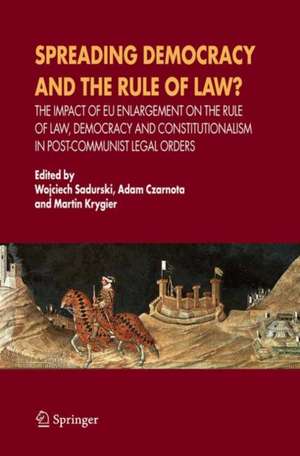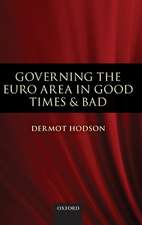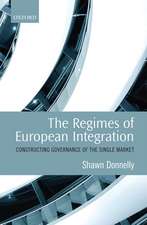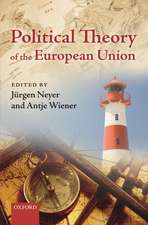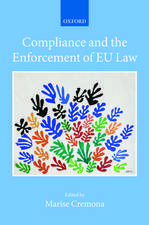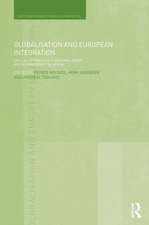Spreading Democracy and the Rule of Law?: The Impact of EU Enlargemente for the Rule of Law, Democracy and Constitutionalism in Post-Communist Legal Orders
Editat de Wojciech Sadurski, Adam Czarnota, Martin Krygieren Limba Engleză Hardback – 28 feb 2006
| Toate formatele și edițiile | Preț | Express |
|---|---|---|
| Paperback (1) | 949.55 lei 43-57 zile | |
| SPRINGER NETHERLANDS – 19 oct 2010 | 949.55 lei 43-57 zile | |
| Hardback (1) | 957.32 lei 43-57 zile | |
| SPRINGER NETHERLANDS – 28 feb 2006 | 957.32 lei 43-57 zile |
Preț: 957.32 lei
Preț vechi: 1167.45 lei
-18% Nou
Puncte Express: 1436
Preț estimativ în valută:
183.19€ • 191.74$ • 152.47£
183.19€ • 191.74$ • 152.47£
Carte tipărită la comandă
Livrare economică 31 martie-14 aprilie
Preluare comenzi: 021 569.72.76
Specificații
ISBN-13: 9781402038419
ISBN-10: 1402038410
Pagini: 390
Ilustrații: XII, 390 p.
Dimensiuni: 155 x 235 x 29 mm
Greutate: 0.79 kg
Ediția:2006
Editura: SPRINGER NETHERLANDS
Colecția Springer
Locul publicării:Dordrecht, Netherlands
ISBN-10: 1402038410
Pagini: 390
Ilustrații: XII, 390 p.
Dimensiuni: 155 x 235 x 29 mm
Greutate: 0.79 kg
Ediția:2006
Editura: SPRINGER NETHERLANDS
Colecția Springer
Locul publicării:Dordrecht, Netherlands
Public țintă
ResearchCuprins
Democratic Institutions and Practices.- EU Enlargement and Democracy in New Member States.- The Eastern EU Enlargement and the Janus-headed Nature of the Constitutional Treaty.- A Problem of their Own, Solutions of their Own: CEE Jurisdictions and the Problems of Lustration and Retroactivity.- Citizens and Foreigners in the Enlarged Europe.- Sub-National Governance in Central and Eastern Europe: Between Transition and Europeanization.- The Copenhagen Criteria and the Evolution of Popular Consent to EU Norms: From Legality to Normative Justifiability in Poland and the Czech Republic.- Constitutionalism.- Becoming “Europeans”: The Impact of EU “Constitutionalism” on Post-Communist Pre-Modernity.- Happy Returns to Europe? The Union’s Identity, Constitution-Making, and its Impact on the Central European Accession States.- An Evolutionary Approach to the Constitutionalism of an Enlarged EU: Why will Cognitive and Cultural Boundaries Matter?.- Constitutional Tolerance and EU Enlargement: The Politics of Dissent?.- Europeanization Through Judicial Activism? The Hungarian Constitutional Court’s Legitimacy and the “Return to Europe”.- The Rule of Law.- Barbarians ante portas or the Post-Communist Rule of Law in Post-Democratic European Union.- Transformation and Integration of Legal Cultures and Discourses—Poland.- EU Enlargement and the Constitutional Principle of Judicial Independence.- Post-Communist Legal Orders and the Roma: Some Implications for EU Enlargement.- A Europe of Variable Geometry: Still a Winning Model?.- Concluding Remarks.- Conclusions: The Adhesion of New Member States to the European Union and the European Constitution.
Textul de pe ultima copertă
The accession of eight post-communist countries of Central and Eastern Europe (and also of Malta and Cyprus) to the European Union in 2004 has been heralded as perhaps the most important development in the history of European integration so far. While the impact of the enlargement on the constitutional structures and practices of the EU has already generated a rich scholarly literature, the influence of the accession on constitutionalism, democracy, human rights and the rule of law among the new member states has been largely ignored. This book fills this gap, and addresses the question of the consequences of the "external force" of European enlargement upon the understanding and practice of democracy and the rule of law and among both the main legal-political actors and the general public in the new member-states. A number of leading legal scholars, sociologists and political scientists, both from Central and Eastern Europe and from outside, address these issues in a systematic and critical way. Taken together, these essays help answer a fundamental question: does the European Union have the potential of promoting and consolidate democracy and human rights?
Caracteristici
Topicality: shortly after the accession of 8 new member states from Central and Eastern Europe to the EU Scholarly and political importance: what is the potential of the EU to "promote democracy and the rule of law"? Originality: no other book has addressed this set of issues in such a comprehensive and inter-disciplinary way Academic quality: the authors are among the leading scholars of European integration, comparative law and political sociology
